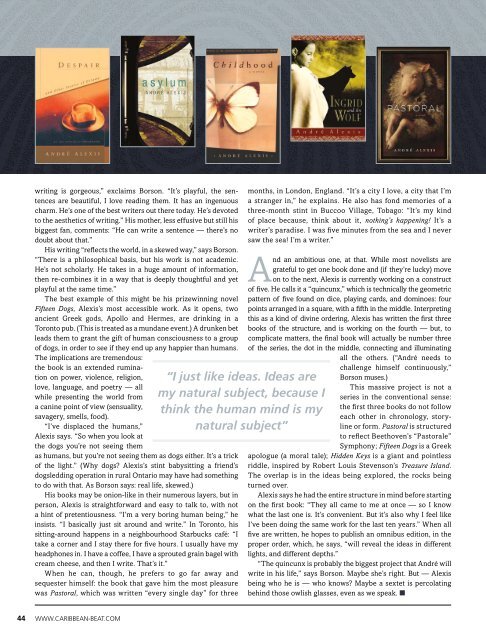You also want an ePaper? Increase the reach of your titles
YUMPU automatically turns print PDFs into web optimized ePapers that Google loves.
writing is gorgeous,” exclaims Borson. “It’s playful, the sentences<br />
are beautiful, I love reading them. It has an ingenuous<br />
charm. He’s one of the best writers out there today. He’s devoted<br />
to the aesthetics of writing.” His mother, less effusive but still his<br />
biggest fan, comments: “He can write a sentence <strong>—</strong> there’s no<br />
doubt about that.”<br />
His writing “reflects the world, in a skewed way,” says Borson.<br />
“There is a philosophical basis, but his work is not academic.<br />
He’s not scholarly. He takes in a huge amount of information,<br />
then re-combines it in a way that is deeply thoughtful and yet<br />
playful at the same time.”<br />
The best example of this might be his prizewinning novel<br />
Fifteen Dogs, Alexis’s most accessible work. As it opens, two<br />
ancient Greek gods, Apollo and Hermes, are drinking in a<br />
Toronto pub. (This is treated as a mundane event.) A drunken bet<br />
leads them to grant the gift of human consciousness to a group<br />
of dogs, in order to see if they end up any happier than humans.<br />
The implications are tremendous:<br />
the book is an extended rumination<br />
on power, violence, religion,<br />
love, language, and poetry <strong>—</strong> all<br />
while presenting the world from<br />
a canine point of view (sensuality,<br />
savagery, smells, food).<br />
“I’ve displaced the humans,”<br />
Alexis says. “So when you look at<br />
the dogs you’re not seeing them<br />
as humans, but you’re not seeing them as dogs either. It’s a trick<br />
of the light.” (Why dogs? Alexis’s stint babysitting a friend’s<br />
dogsledding operation in rural Ontario may have had something<br />
to do with that. As Borson says: real life, skewed.)<br />
His books may be onion-like in their numerous layers, but in<br />
person, Alexis is straightforward and easy to talk to, with not<br />
a hint of pretentiousness. “I’m a very boring human being,” he<br />
insists. “I basically just sit around and write.” In Toronto, his<br />
sitting-around happens in a neighbourhood Starbucks café: “I<br />
take a corner and I stay there for five hours. I usually have my<br />
headphones in. I have a coffee, I have a sprouted grain bagel with<br />
cream cheese, and then I write. That’s it.”<br />
When he can, though, he prefers to go far away and<br />
sequester himself: the book that gave him the most pleasure<br />
was Pastoral, which was written “every single day” for three<br />
“I just like ideas. Ideas are<br />
my natural subject, because I<br />
think the human mind is my<br />
natural subject”<br />
months, in London, England. “It’s a city I love, a city that I’m<br />
a stranger in,” he explains. He also has fond memories of a<br />
three-month stint in Buccoo Village, Tobago: “It’s my kind<br />
of place because, think about it, nothing’s happening! It’s a<br />
writer’s paradise. I was five minutes from the sea and I never<br />
saw the sea! I’m a writer.”<br />
And an ambitious one, at that. While most novelists are<br />
grateful to get one book done and (if they’re lucky) move<br />
on to the next, Alexis is currently working on a construct<br />
of five. He calls it a “quincunx,” which is technically the geometric<br />
pattern of five found on dice, playing cards, and dominoes: four<br />
points arranged in a square, with a fifth in the middle. Interpreting<br />
this as a kind of divine ordering, Alexis has written the first three<br />
books of the structure, and is working on the fourth <strong>—</strong> but, to<br />
complicate matters, the final book will actually be number three<br />
of the series, the dot in the middle, connecting and illuminating<br />
all the others. (“André needs to<br />
challenge himself continuously,”<br />
Borson muses.)<br />
This massive project is not a<br />
series in the conventional sense:<br />
the first three books do not follow<br />
each other in chronology, storyline<br />
or form. Pastoral is structured<br />
to reflect Beethoven’s “Pastorale”<br />
Symphony; Fifteen Dogs is a Greek<br />
apologue (a moral tale); Hidden Keys is a giant and pointless<br />
riddle, inspired by Robert Louis Stevenson’s Treasure Island.<br />
The overlap is in the ideas being explored, the rocks being<br />
turned over.<br />
Alexis says he had the entire structure in mind before starting<br />
on the first book: “They all came to me at once <strong>—</strong> so I know<br />
what the last one is. It’s convenient. But it’s also why I feel like<br />
I’ve been doing the same work for the last ten years.” When all<br />
five are written, he hopes to publish an omnibus edition, in the<br />
proper order, which, he says, “will reveal the ideas in different<br />
lights, and different depths.”<br />
“The quincunx is probably the biggest project that André will<br />
write in his life,” says Borson. Maybe she’s right. But <strong>—</strong> Alexis<br />
being who he is <strong>—</strong> who knows? Maybe a sextet is percolating<br />
behind those owlish glasses, even as we speak. n<br />
44 WWW.CARIBBEAN-BEAT.COM


















